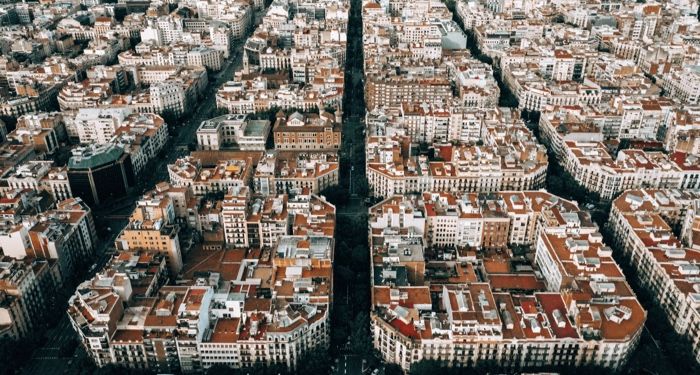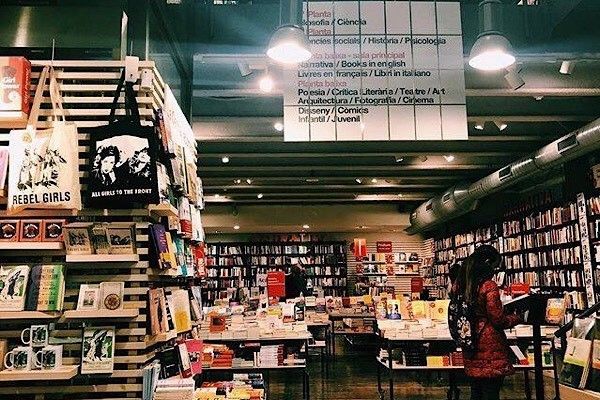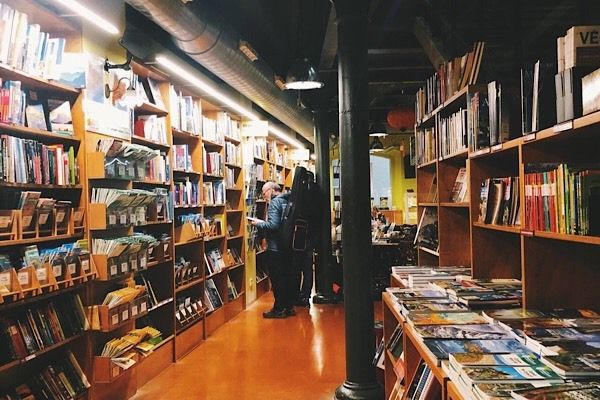
My Literary Adventure Through Barcelona
I’m here to tell you the top places in Barcelona to read, find books, and explore literary history. This is meant not as a comprehensive guide but as a firsthand one: when I visited the city earlier this year, these are the bookish places I visited, discovered, and adored, the places that made me feel peaceful or connected to Barcelona’s long and glorious literary tradition. Here are the bookish places you should one day visit to best celebrate and enjoy literary Barcelona.
The Bars
At the end of my first full day in Barcelona, I sat down at Bar Marsella in a small wooden chair and ordered an absinthe from the bar. I placed the two sugar cubes on the small fork and gently dropped water onto them until they had melted, hazily, into my glass. Then I sipped, opening my book. I was in heaven.
Bar Marsella was one of Ernest Hemingway’s favorite haunts. Pablo Picasso hung out here as well. It is a dark, cozy place with signs from Franco’s time that ban congregating and singing. The bartenders are terse and straightforward. Around me, many tourists had their first taste of absinthe and then quickly reverted to simple beer. I found myself surprised at how much I loved the sweet yet bitter, grassy drink. I met a few ex-pats from America and quickly made friends with them, which seemed fitting. I thought about Hemingway’s hand resting on the same table where I sat, and I was filled with a cozy yet thrilling awe.
Bookshops & Libraries
There are many incredible bookstores in Barcelona. The first I visited is La Central del Raval, which was large with a huge selection, and it also had a fantastic section for English readers and a small café.

La Central del Raval
Closer to where I was staying, I found Hibernan, a secondhand English language bookshop that’s perfect for English-speaking tourists who want a new book while traveling. The secondhand books are well-priced, but the shop also boasts some incredible collector’s items, and it’s a place where a bookworm could spend many hours searching through the shelves. At both Hibernan and La Central, I found robust sections of translated books by Spanish, Catalan, and Galician authors, and was able to make careful selections. Laie, meanwhile, was the perfect place to work: a quiet café over a bookshop where people were writing, reading, and studying.
But my favorite bookstore visit in the city, by far, was Altair, a travel-focused bookshop in L’Eixample. Divided by regions of the world, the bookstore is full of books, guides, maps, and more from all over. Globes hang from the ceiling and vintage maps adorn the walls. Travel experts were helping people plan their trip; I overhead a language lesson happening at a nearby table; a couple sat over an outspread map of France, taking notes in a composition book. In the basement is a small but perfect café; the counter is decorated with a bowl of money from all over the world. I ordered a glass of red wine and sat in a comfortable leather chair, reading Carmen Laforet and basking in the sheer bookish joy of the place.

Altair
One of my biggest regrets on my trip to Barcelona was missing out on two libraries. First, the Francesca Bonnemaison Library, originally the Popular Women’s Library. It was the first library in Europe that was meant exclusively for the use of women. It’s set in a medieval building that’s supposed to be absolutely beautiful. I also missed out on the Library of Catalonia. Once the Santa Cruz hospital, it’s now a library with about 3 million books.
The Hideaways
At some point on your trip, you will find yourself half-lost, half-dazed as you wander the curving, maze-like streets of the Gótic, the Gothic Quarter. With its stone streets and old, historic buildings and sporadic lighting, you find yourself in shade, cool breezes chilling you, only to step unexpectedly into a wide, bright square with a gorgeous cathedral overhead. It’s a magical place, and it deserves time. It’s the perfect place to read in a square, a glass of wine at hand, and wandering serves it best; but if you want a destination in mind, go find a hidden, gorgeous place called Story. I stumbled on it completely by accident: a small café where books line the walls. They have journals where they encourage visitors to share a story, and their cocktails are sublime.
Many tourists rush through Parc Güell. It’s understandable: the rush of the crowd can be daunting. But take your time. Go early in the morning. Sit on one of the cool, mosaic tile benches, look out over the city, and read by its morning light. If you start to feel too crowded, then once you leave the ticketed area, go up into the hill a bit—there are picnic tables surrounded by sweet-smelling honeysuckle, and you can read or journal while looking straight out to the sea.
The Festivals and Markets
This one is all about timing. The biggest is of course Sant Jordi Day, The Day of the Rose, April 23 (which also happens to be UNESCO World Book Day). It is a Catalonian tradition around since the 1400s, and to celebrate, people give each other books and flowers. The bookshops fill central streets including the Rambla de Catalunya and the Passeig de Gracia completely with books, and reportedly, it’s a book lover’s paradise. Not around in April? Visit Sant Antoni on a Sunday, where for more than 130 years, there has been a bustling gorgeous book market each week.


